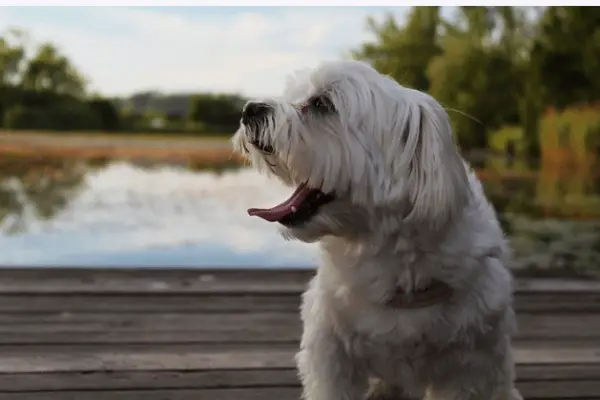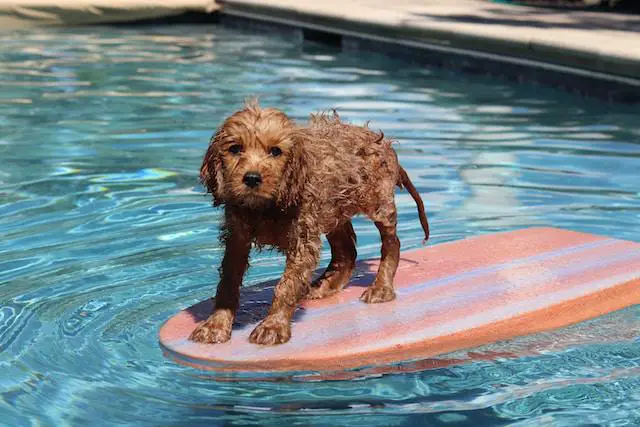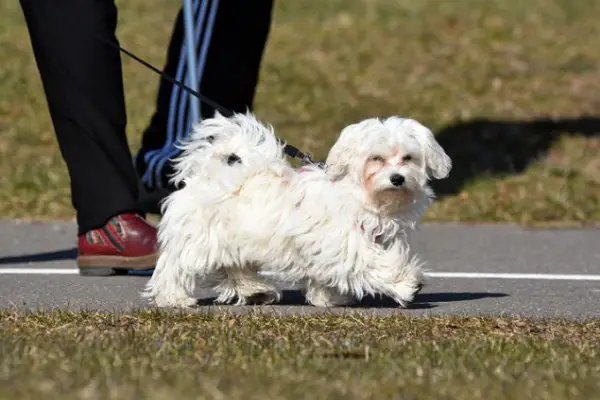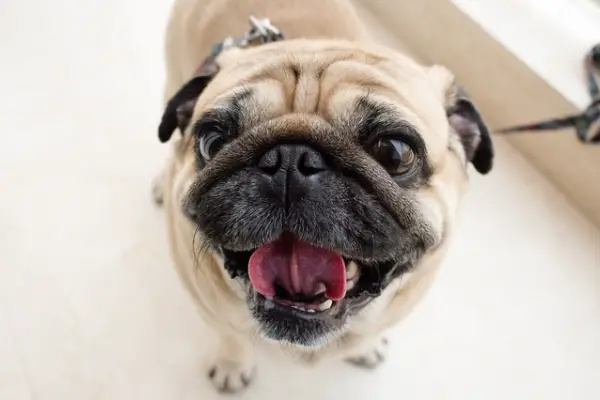9 Common Reasons For Shih Tzu Growling & Tips

Do you have a Shih Tzu that growls? As a Shih Tzu owner, you might find yourself worried or confused about why your furry friend is behaving this way.
In this quick and insightful post, we’ll delve into some of the common reasons why these little pups may growl and what you can do to help them.
So, let’s get started!
Shih Tzu Growling
Shih Tzus may growl if they feel threatened if they think their food or toys are under threat, if they are in pain or discomfort, or if they are expressing excitement or playful behavior.
It is important to observe your specific Shih Tzu behavior to determine the reason behind their growling.
If your Shih Tzu is growling aggressively or excessively, it may require behavioral training or medical attention from a veterinarian.
Common Triggers for Shih Tzu Growling
The following are some common triggers for Shih Tzu growling:
1. Separation Anxiety
When they are away from their humans, Shih Tzu with separation anxiety may growl.
Other actions like whining or destructive conduct could also go along with this.
Training and behavior modification methods may be used to treat separation anxiety, but it’s crucial to collaborate with a qualified dog trainer to create the best strategy possible.
2. Resource Guarding
When Shih Tzus are defending their food or toys, they may growl. This is a normal habit that stems from their innate desire to safeguard their resources.
It’s crucial to engage with a qualified dog trainer to address the habit if your Shih Tzu is growling as a result of resource guarding.
This may entail regulating your dog’s surroundings to discourage resource guarding behavior as well as educating your dog to give up resources readily and without violence.
3. Frustration
Your Shih Tzu may growl to express their unhappiness if they are feeling irritated.
This could be a result of being unable to obtain what they desire or finish a task.
For instance, they could growl in irritation if they are attempting to grasp a toy that is just out of reach.
Encourage your Shih Tzu to find other methods to express their displeasure if they are growling out of irritation.
To refocus their attention, this may entail giving them a cue like “leave it” or “drop it.”
Also, it’s critical to keep your dog out of stressful circumstances.
4. Fear And Anxiety
A Shih Tzu may growl in self-defense if it feels scared or terrified.
This could be brought on by strange people, animals, or surroundings.
For instance, your Shih Tzu may growl out of fear if it meets a big dog for the first time.
Similar to how they would growl in reaction to loud noises like thunder or fireworks.
Introduce new people, animals, and surroundings to your Shih Tzu gradually and under supervision in order to help them overcome their anxiety and lessen growling.
They may feel more at ease and certain in unfamiliar circumstances as a result.
The development of their self-confidence and the reduction of fear-based behavior can both be aided by positive reinforcement training.
5. Pain or discomfort
If someone touches or moves a Shih Tzu in a way that causes them more pain when they are already in pain or discomfort, they may growl.
For instance, if you touch your Shih Tzu’s painful leg, they may growl to tell you to stop.
It is important to appreciate this conduct since it is normal.
A veterinarian should be consulted to address any underlying medical conditions that are causing discomfort.
6. Dominance
Shih Tzus are known for being independent and forceful.
If they feel they need to dominate another dog or human, they may growl to show their power.
If the Shih Tzu acts aggressively against other dogs or people in an effort to establish dominance, this behavior may become troublesome.
If a Shih Tzu was not properly socialized as a puppy, it may growl when they feel threatened or uneasy.
Dogs need to be socialized to learn how to behave calmly and confidently among humans, other animals, and their environment.
Shih Tzus may exhibit growling and other aggressive characteristics if they are not properly socialized.
Shih Tzus should be socialized and exposed to a variety of people, animals, and settings from an early age by their owners.
8. Play aggression
Shih Tzus may growl when playing to show eagerness or enthusiasm. Often, this is a harmless activity and there is no need for alarm.
Owners must be capable of distinguishing between growling that is amusing and snarling that indicates hostility or discomfort.
9. A sign of aggression
A Shih Tzu may occasionally growl as a result of aggressive behavior.
This could be a result of prior unpleasant events, including being mistreated or attacked by another dog.
A lack of socialization may also be the cause, which increases their propensity for violence.
See a trained dog trainer if your Shih Tzu consistently exhibits aggressive behavior.
How to Prevent Shih Tzu Growling
Here are some common ways to prevent Shih Tzu growling:
- Address the underlying cause: Shih Tzus can growl for a variety of reasons, including fear, anxiety, or feeling threatened. Identifying the root cause and addressing it can help prevent growling.
- Socialize your dog: Early socialization is important to expose your Shih Tzu to different people, other dogs, and environments. This can help prevent growling due to fear or anxiety in new situations.
- Train your dog: Regular training can help establish clear boundaries and reinforce positive behavior. This can help prevent growling due to frustration, aggression, or territorial behavior.
- Use positive reinforcement: Rewarding your Shih Tzu for good behavior can encourage them to continue behaving well and reduce the likelihood of growling.
- Provide mental and physical stimulation: Shih Tzus need exercise and mental stimulation to prevent boredom and frustration, which can lead to growling.
- Give your Shih Tzu their own space: Providing a safe and comfortable retreat for your Shih Tzu can help reduce anxiety and prevent growling.
- Avoid physical punishment: Using physical punishment or negative reinforcement can cause fear and aggression, leading to growling.
- Seek professional help: If your Shih Tzu’s growling is persistent or severe, seeking help from a professional dog trainer or behaviorist can provide insight and guidance on how to address the behavior.
- Be patient and consistent: Changing behavior takes time and consistency. Be patient and consistent in your approach to training and addressing your Shih Tzu’s growling behavior.
What to Do When Your Shih Tzu Growls
Here are some steps you can take when your Shih Tzu growls:
- Keep your cool: Don’t panic or lose your temper. Approach your dog with patience and kindness.
- Identify the root cause: Look for the source of your Shih Tzu’s growl. Is it a result of pain, fear, or the need to defend their territory?
- Eliminate the trigger: If at all feasible, get rid of the thing that makes your Shih Tzu snarl. Move them away from the other dog, for instance, if they are snarling at it.
- Never punish your Shih Tzu for growling. Punishment may increase their dread and exacerbate the problem.
- Consult a specialist: Consider speaking with a qualified dog trainer or behaviorist if the growling persists or gets worse. They can show you methods to deal with the growling and assist you in determining its source.
Keep in mind that growling is a typical form of dog communication, and to preserve a good relationship with your Shih Tzu, it’s crucial to respond to it in a kind and non-threatening manner.
Frequently Asked Questions
Why does Shih Tzu growl?
Shih Tzus may growl for a variety of reasons, such as feeling threatened or scared, seeking attention, or trying to communicate their boundaries.
It’s important to observe your dog’s body language and context to better understand why they may be growling.
Is it normal for my Shih Tzu to growl?
Yes, growling can be a normal part of Shih Tzu’s communication.
However, if it is excessive or aggressive, it could be a sign of an underlying issue that should be addressed.
How can I stop my Shih Tzu from growling?
Training and socialization can help reduce growling behavior.
It’s important to work with a professional trainer or behaviorist to identify the root cause of your Shih Tzu’s growling and develop an appropriate training plan.
Is growling a sign of aggression in Shih Tzus?
Growling may be a warning sign of aggression, but it doesn’t necessarily mean that your Shih Tzu is aggressive.
Again, it’s important to observe their body language and context to better understand the meaning behind their behavior.
Can I punish my Shih Tzu for growling?
Punishing your Shih Tzu for growling can actually make the behavior worse and cause them to become more aggressive.
Instead, focus on positive reinforcement training methods and seek the help of a professional if needed.
When should I be concerned about my Shih Tzu’s growling?
If your Shih Tzu’s growling is excessive or seems aggressive, or if it is accompanied by other concerning behaviors such as biting or snapping, it’s important to seek the help of a professional trainer or behaviorist to address the issue before it escalates.
Conclusion
If your Shih Tzu is growling, it’s important to address the behavior immediately.
While growling is a natural form of communication for dogs, it can also be a sign of fear or aggression.
By understanding the root cause of the behavior, you can take the necessary steps to help your furry friend feel safe and comfortable.
With patience and positive reinforcement, you can train your Shih Tzu to communicate their needs in a non-threatening way and enjoy a long and happy life together.
So don’t let growling go unchecked – take action and help your pet feel loved, safe, and happy!

![Understanding Maternal Aggression in Dogs [Useful Hints] Maternal Aggression in Dogs](https://petcreeks.com/wp-content/uploads/2023/10/pexels-briseed-14846036.jpg)




